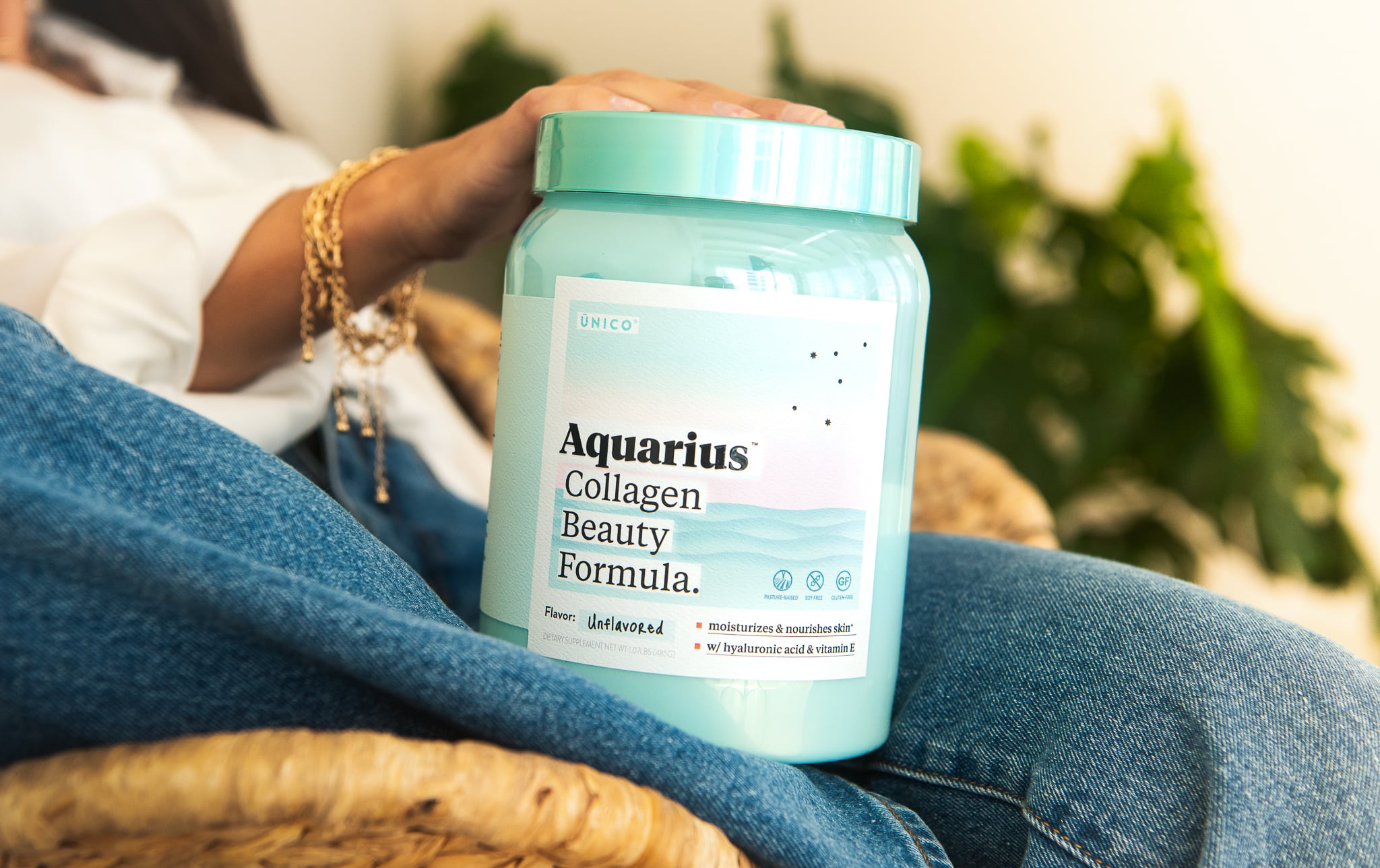Collagen is by the far the most popular beauty supplement of the last decade. But with so many types, and different sources, it can be confusing to know which kind of collagen to choose. In this guide, we’ll go over the benefits of each kind, so you can ‘collagen confidently’.

Did you know that collagen is found in virtually every part of your body?
It’s true.
Collagen plays a major role not only in your appearance, but also in many aspects of your overall health.
For this reason, adding a collagen supplement to your stack is one of the best things you can do for your body.
But before you jump over to Amazon (or preferably our shop) to browse your options, know this:
It’s important to supplement with the right type of collagen in order to get its full benefits.
To discover just what those benefits are, keep reading this guide, in which we’ll explain the different collagen types, benefits, and best way to get the right amount for you.
But before we dive into the deep end, let’s start with some basics.
What Is Collagen?
Collagen is one of the many types of protein found in the human body, making up about one-third of your body’s total protein content.
Collagen is found in all of the body’s connective tissues, which includes:
- skin
- muscles
- cartilage
- tendons
- joints
…and many others.
There are 28 different types of collagen, all of which play distinct roles in the structure, organization, and shape of your body’s tissues.
Your body uses amino acids from your diet to produce various types of collagen.
However, around your mid-20s, your body’s production of collagen begins to decrease.
Other ‘collagen-zapping’ lifestyle factors include:
- vitamin C deficiency
- smoking
- UV radiation
- exposure to pollution
To maintain your body’s supplies of collagen, supplementing is imperative.
For this reason, it’s important to understand the different types of collagen, their benefits, and their sources.
We’ll cover everything in detail in the following sections so you can easily replenish your body’s collagen supply.
What Are the Different Types of Collagen?
Although there are 28 types of collagen, basically there are five of them that play the majority of roles in your body and physiology.
These five are the most important for supplementing.
Here’s an overview of each, and what they do in your body.
Type I Collagen
This type of collagen makes up 90% of your body’s collagen supply.
I repeat.
Type I collagen is by FAR the most common type of collagen found in your body.
It can be found in the skin, bone, connective tissue, fibrous cartilage, and even scar tissue.
Type I collagen plays a significant role in your skin’s elasticity and hydration, and also supports your body’s ability to heal physical wounds.
Type II Collagen
This type of collagen is mainly found in your body’s elastic cartilage.
While it does not play a significant role in your skin’s appearance, it is quite important for supporting joint health, joint comfort, and range of motion.
Type II collagen is beneficial as we get older, and our joints start to become less lubricated.
Type III Collagen
This type of collagen is mostly found in your body’s muscles, organs, and blood vessels.
This type of collagen facilitates the formation of blood platelets.
As such, it plays a role in blood clotting.
In addition, some studies show that supplementing with type III collagen can support exercise performance and muscle recovery while helping the body build muscle mass.
Type IV Collagen
This type of collagen is found primarily in the basal lamina layer of your skin.
This is a deep layer of the skin that surrounds muscle, and fat tissue.
It plays various roles in the body which include:
- kidney filtration
- wound healing
- digestive health
This type of collagen is also associated with optimal gut health.
Type V Collagen
Type V collagen is found in the skin, nails, and hair, which makes it an important part of your overall appearance.
Furthermore, it plays a role in the formation of the placenta during pregnancy.
Since the placenta provides the embryo with nutrients, type V collagen is crucial for a healthy pregnancy.
What Are the Benefits of Collagen?
Because collagen is found in so many different parts of the body, its benefits are numerous.
As your read above, the five main types of collagen affect not only appearance, but also the most vital aspects of your physical health.
It can improve the appearance of your skin, help you to heal from injuries, support your sleep, and provide various other benefits.
Collagen can even play a role in weight loss, and help reduce cellulite.
How Long Does Collagen Take to Work?
If you’re supplementing with collagen for cosmetic reasons — such as for supporting proper skin elasticity, reducing the appearance of wrinkles, and reducing the appearance of blemishes — then you might see the benefits in about eight weeks.
However, for general health reasons, the benefits of collagen may be evident almost immediately.
Read on to find out the many, many benefits of supplementing with collagen.
1. Meet Your Amino Acid Requirements
Of the 20 amino acids that your body needs to maintain its physiological processes, nine are categorized as essential amino acids.
What does this mean?
Essentially, your body cannot synthesize them on its own.
As such, you must get these amino acids from outside sources.
For various reasons, many individuals may not get their daily amino acid requirements, which can result in a deficiency.
To fill this gap, collagen supplementation may be vital.
Collagen contains high amounts of glycine, hydroxyproline, proline, and alanine, which can assist your body with performing various functions.
2. Keep Your Skin Plump and Smooth
Your skin is largely made out of collagen, which is responsible for keeping your skin tight, firm, and elastic, promoting a more youthful appearance.

Our collagen production begins to decline in our mid-20s, which can accelerate wrinkling and sagging skin.
Fortunately, supplementing with collagen may help reduce signs and symptoms of skin aging.
One study found that supplementing with just 2.5 grams of collagen per day for eight weeks reduced the appearance of eye wrinkling by about 20%.
The same study found that this type of supplementation increased the skin’s elastin supply by 18%, which plays a significant role in supporting skin elasticity.
Another study found that just 1 gram of collagen per day may help reduce skin dryness by 76%, which can make your skin look much more firm and plump.
What’s more, supplementing with collagen can even reduce the appearance of cellulite.
While it may seem like the appearance of your skin is, well, skin-deep, there’s actually much more to it than that.
Your skin health is a major sign of your overall health.
So, by improving the appearance of your skin, you are also doing a lot to improve the overall state of your physical health.
Similar to collagen, there is also a great deal of research showing how certain antioxidants can also help improve skin health.
Find out which antioxidants are best for your skin here.
3. Improve Joint Health
Your joints contain high amounts of collagen.
If you experience a significant collagen deficiency, then you may begin to suffer from various joint conditions.
Fortunately, supplementing with collagen may help reduce joint discomfort and swelling.
Of course, there’s no reason to wait until you experience joint discomfort to begin supplementing with collagen.
Maintaining your body’s collagen supplies can be a preventative measure in staving off joint issues in the future.
4. Improve Athletic Performance
It may seem like whey protein powder gets all the attention when it comes to improving athletic performance.
After all, you need to up your protein intake if you want to build stronger and bigger muscles.
However, studies also show that collagen supplementation can play a role in this process.
By providing your body with “extra” amino acids, it can allow your body to use up certain amino acids for performance-related processes while putting the remaining amino acids to other uses.
One study found that, even without any other protein supplementation, consuming collagen can significantly increase muscle growth during a strength training routine.
Aside from aiding with muscle growth, supplementing with collagen can also improve the performance of your tendons.
Because tendons help your muscles move, keeping them healthy can make it much easier to perform various exercises.
5. Counteract the Negative Effects of Meat
We’re definitely not saying that meat is unhealthy.
After all, it has various essential amino acids that your body can’t get from other sources.
That said, the way that meat is consumed may not necessarily be the healthiest.
Instead of consuming meat with skin, bone, connective tissue, and various other parts, many people only go for lean muscle tissue.
Options such as chicken breast, pork chop, and steak are delicious and can be easily thrown on top of a salad.
However, because different parts of the animal have different amino acid profiles, consuming too much of one type of meat can lead to an imbalance in amino acids.
Meat contains high amounts of methionine, while collagen contains high amounts of glycine, in addition to a few other amino acids.
A too-high amount of methionine in proportion to glycine can be damaging to health.
Some studies have even found an association between high methionine consumption and risk factors for heart conditions, and various other problems.
This might be one reason why doctors would recommend reducing meat consumption.
However, ramping up your consumption of glycine, which is the main component of most types of collagen, may help support your heart health.
6. Get Some ZZZs
Collagen has various effects on your central nervous system, which can go a long way in supporting the quality of your sleep.
In the first place, collagen does this by increasing serotonin production, which has a calming effect on your brain.
It can also decrease your body temperature if taken right before sleep, because — let’s face it — there’s nothing worse for sleep than feeling hot.
While researchers may not have a complete understanding of how collagen affects sleep, studies show that supplementing with collagen may help support subjective sleep quality and daytime performance.
When you consider all of collagen’s other benefits, supplementing with it seems like a no-brainer!
7. Accelerate Healing
Supplementing with collagen can support your body’s healing process from all types of traumatic injuries by promoting the action of fibroblasts, which is a type of cell found in connective tissue.
In addition, supplementing with collagen can increase how much collagen there is in the location of the wound. This helps to support the growth of new tissue.
Even if you’re not dealing with any injuries, you can use collagen to support muscle recovery after your most intense workouts.
How Much Collagen Do I Need?
Before we get into talking about collagen dosing, and how much collagen you need per day, let’s quickly go over what type of collagen you should be supplementing with.
While regular collagen is found in many parts of your body, it is not something that you can actually supplement with.
This is because your body is not able to break it down and deliver it to your cells.
Instead, you have to supplement with collagen in a different form, which is referred to as collagen peptides, or hydrolyzed collagen.
Collagen peptides are extracted from animal collagen sources.
However, instead of being sold in its regular form, this collagen is broken down in a process called enzymatic hydrolysis.
The end product?
Collagen that can be easily absorbed by the body so you get its maximum benefits.
That said, there are various sources of collagen (more on this below).
But if you’re supplementing with collagen peptide powder, then you may want to aim for about 10 grams per day.
Related Reading: How Much Protein Per Day Do You Need?
What Is the Best Source of Collagen?
Aside from collagen supplements, there are many ways to get your daily fix of collagen.
Here are some of our favorite sources of collagen for you to consider.
Bone Broth
For a simple, delicious, and totally DIY-able way to get your collagen intake up, we recommend drinking bone broth.
Whether it’s chicken, beef, or pork, it can be made in a huge batch and stored for months in the freezer.
Gelatinous Meats
Instead of going for only lean meat, make sure to consume other parts of the animal.
Meat with a jelly-like texture is the best way to accomplish this.
Go for yummy options such as oxtails, shanks, ribs, and any other similar cuts. We promise these turn out great in the slow cooker!
Meat With Skin
We might have gotten a little too used to taking the skin off various meat cuts.
While it may be fatty, it’s definitely good for you.
After all, skin is almost pure collagen.
So, next time you eat a juicy chicken thigh or a tender piece of pork belly, make sure to eat the whole thing for an extra boost of collagen.
Collagen Supplement
Not all of us have access to high-quality meat to get our daily collagen fix.
And to be honest, sometimes we don’t even have time to eat.
For this reason, we’re big fans of supplementing with collagen.
A collagen powder can be easily taken on the go if mixed with your daily cup of coffee, morning smoothie, or even a plain cup of water.
You can even add to your cooking recipes, such as soups, stews, stir-fry, pasta, and so on.
Because collagen powder is flavorless, it can be customized to be as sweet or savory as you want.
What Is the Best Way To Take Collagen?
If you’re worried about the time that you should take your collagen, there is very limited consensus amongst scientists.
As such, make sure to take a high dose of collagen (at least 10 grams per day) at a time that works best for you.
This can be in the morning as you sip your daily cup of joe, with any meal during the day, or right before bed.
It might also help to supplement with vitamin C as this essential vitamin helps to amp up your body’s collagen production.
You can also get this vitamin from natural sources, such as bell peppers, strawberries, tomatoes, and various citrus fruits.
That said, doing this is not necessary to get the benefits of a collagen supplement.
If you want to maximize your body’s collagen, then we recommend decreasing lifestyle habits that break down collagen in the body.
We all know how important it is to avoid excessive sun exposure, pollution, and smoking.
But did you know that eating sugar can also break down collagen in the body?
Through a process called glycation’, in which sugar molecules bind to fat and protein molecules in the skin, producing an enzyme that can destroy them.
For this reason, we’d try to keep our consumption of sweets to a minimum!
How Long Does it Take for Collagen to Start Working?
If you’re supplementing with collagen for cosmetic reasons — such as for supporting proper skin elasticity, reducing the appearance of wrinkles, and reducing the appearance of blemishes — then you might see the benefits in about eight weeks.
However, for general health reasons, the benefits of collagen may be evident almost immediately.
Read on to find out the many, many benefits of supplementing with collagen.
The Bottom Line:
Supplementing with collagen has a variety of benefits for your skin’s appearance, joint health, injury recovery, sleep quality, and overall physical health.
In many cases, it’s not possible to get all the collagen you need from your food.
For this reason, we’re big fans of supplementing with collagen powder.
But why stop at just collagen?
UNICO’s Aquarius Collagen Beauty Formula contains not only your daily collagen requirement but lots of other beauty supplements, such as hyaluronic acid and vitamin E.
With regular supplementation, you’ll be your glowiest self in no time!
Sources:
Amino Acid Deficiency – an overview | ScienceDirect Topics
High dietary methionine intake increases the risk of acute coronary events in middle-aged men | NCBI
Recommended Reading:
- Holiday ‘Jingle Balls’ – A Festive Take on No-Bake Protein Balls - December 20, 2023
- Cryptic Cold Brew – A Must-Try for the Most Mischievous - October 31, 2023
- Does Protein Powder Make You Gain Weight? - October 4, 2022
